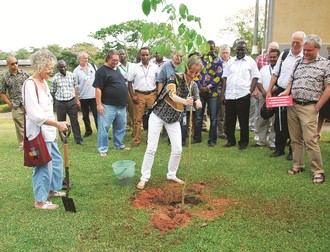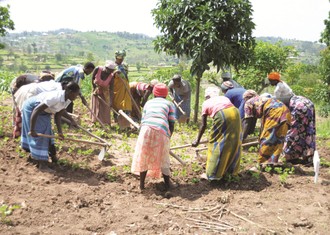Ibadan, 21 November 2012 – Humidtropics, a major new research-for-development program launched today, aims at increasing average farm income by 50% with 25% of poor households lifted above the poverty line in the humid tropics in the next 15 years. Research leading to production system intensification will boost yields of staple crops and help to reduce the number of malnourished children by 30%.
“Humidtropics helps farm families to make better decisions about making their living and living their lives while caring for the environment they cultivate,” says Dr Ylva Hillbur, Deputy Director General Research with the International Institute of Tropical Agriculture (IITA)—the Lead Center for the program.
 The humid tropics are the vast hot and wet areas around the equator that are home to about 2.9 billion people living on 3 billion hectares of land. Agricultural systems span the humid tropics from the integrated tree crops-based systems such as cocoa plantations in West Africa, banana-based systems in East and Central Africa to intensive-mixed systems in Asia and vulnerable integrated crop-livestock systems in Central America and the Caribbean. Intensifying agriculture in these areas offers the best potential to reduce poverty, especially among women and other vulnerable groups. The bulk of the rural poor reside in the humid tropics, which are also associated with poor household nutrition and soil fertility depletion. Even so, the humid tropics are critical to global food supplies and meeting world food demand, central to the maintenance of global biodiversity, and vital to the mitigation of greenhouse gases. “Humid Tropics provide the opportunity to assess the role of potato and sweetpotato for the sustainable intensification of production systems where these crops are a key component of farmer livelihood strategies”, says Dr Oscar Ortiz, CIP’s focal point for Humidtropics. This is the case of East and West Africa and the Greater Mekong Region of Asia.
The humid tropics are the vast hot and wet areas around the equator that are home to about 2.9 billion people living on 3 billion hectares of land. Agricultural systems span the humid tropics from the integrated tree crops-based systems such as cocoa plantations in West Africa, banana-based systems in East and Central Africa to intensive-mixed systems in Asia and vulnerable integrated crop-livestock systems in Central America and the Caribbean. Intensifying agriculture in these areas offers the best potential to reduce poverty, especially among women and other vulnerable groups. The bulk of the rural poor reside in the humid tropics, which are also associated with poor household nutrition and soil fertility depletion. Even so, the humid tropics are critical to global food supplies and meeting world food demand, central to the maintenance of global biodiversity, and vital to the mitigation of greenhouse gases. “Humid Tropics provide the opportunity to assess the role of potato and sweetpotato for the sustainable intensification of production systems where these crops are a key component of farmer livelihood strategies”, says Dr Oscar Ortiz, CIP’s focal point for Humidtropics. This is the case of East and West Africa and the Greater Mekong Region of Asia.
 The 15-year innovative CGIAR research program will help poor farm families, mostly led by women, to boost their agricultural productivity while conserving the land for future generations. The program will also serve as a model to other agencies seeking to link agricultural systems research to developmental impact.
The 15-year innovative CGIAR research program will help poor farm families, mostly led by women, to boost their agricultural productivity while conserving the land for future generations. The program will also serve as a model to other agencies seeking to link agricultural systems research to developmental impact.
The initial program participants include the International Center for Tropical Agriculture (CIAT), International Livestock Research Institute (ILRI), World Agroforestry Centre (ICRAF), International Potato Center (CIP), Bioversity International, International Water Management Institute (IWMI), International Centre of Insect Physiology and Ecology (icipe), Forum for Agricultural Research in Africa (FARA), AVRDC – The World Vegetable Center (AVRDC), and Wageningen University. Partnerships are key to the success of this program and Humidtropics invites people to register their interest at http://humidtropics.org/contact.
For more information, contact
Humidtropics Office, Humidtropics@cgiar.org
Godwin Atser, g.atser@cgiar.org
Ylva Hillbur, ylva.hillbur@cgiar.org
Eric Koper, e.koper@cgiar.org
www.humidtropics.org
www.iita.org
Interested in becoming a partner? http://humidtropics.org/contact
